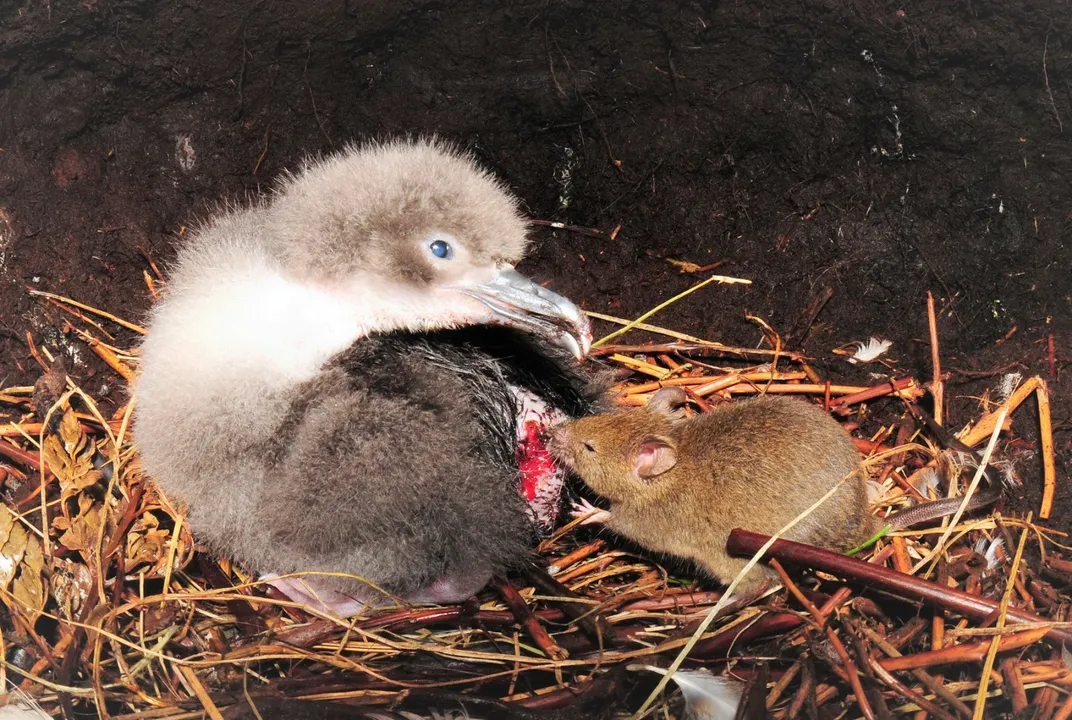Invasive Mice Are Gnawing the Scalps of Endangered Albatrosses
The mice already kill an estimated 2 million seabird chicks per year, but they now target breeding adults
/https://tf-cmsv2-smithsonianmag-media.s3.amazonaws.com/filer/86/8a/868a35cb-8a15-46ab-b5a5-cacc5a6efb4e/mouse_bird.jpg)
House mice are an annoyance for humans, but for some seabirds, the tiny little critters are an existential threat. For years, scientists have recorded the little mammals munching on seabird eggs and chicks on remote breeding islands. Now, new images reveal that mice on one island also have a taste for both adult seabirds, which makes them an even bigger ecological threat.
The phenomenon was recorded on Gough Island, part of the U.K. Overseas Territory Tristan da Cunha, an island group in the South Atlantic between southern Africa and South America, according to the Royal Society for the Protection of Birds (RSPB). The island, a designated World Heritage Site, hosts 8 million breeding seabirds from 24 different species, including the critically endangered Tristan albatross. Only 2,000 breeding pairs of that species survive, with 99 percent of them breeding on Gough Island.
Those seabirds evolved in the absence of mice or other mammalian nest predators. So when mice hitched a ride to the island aboard ships in the 19th century, the birds had no defenses against them. Over the course of more than a century, the island mice evolved to be about 50 percent larger than normal house mice, which allows them to munch on larger food sources. One of their favorite meals is seabird eggs and chicks. The mice are known to take bites out of prey nearly 300 times their own size. If a chick survives the assault, the open wounds, including scalping, caused by the snack attack often leads to death.
For birds with long lives that don’t breed until they are more than a decade old, losing their young can threaten the survival of the entire population. A study released in 2018 found that the mice kill 2 million seabird chicks per year on Gough Island alone. Nearby Marion Island, which hosts similarly large number of seabirds, also faces the same threat from the rodents.
Video cameras placed near the nests of the albatrosses during the 2019 breeding season showed that the mice group up into packs as large as nine rodents to devour the chicks alive. The cameras also showed the mice nibbling on the adults, which is even more troubling.
“We have known for more than a decade that the mice on Gough Island attack and kill seabird chicks,” Chris Jones, senior Gough field assistant with the RSPB says in the press release. “While this is already of great concern, attacks on adults, which can produce dozens of chicks in their lifetime, could be devastating for the populations’ chances of survival of these long-lived seabirds. It’s a terrible development, and these gentle giants could now be lost even more rapidly than we first predicted.”

In a blog post, Gough Island field researcher Chris Jones writes that because mice are opportunistic and breed rapidly, changes in behavior spread through the population like wildfire. He points out that mice in certain pockets of Marion Island have begun scalping chicks, a troubling style of predation that could spread across the island.
He also notes that in 2017, he and his colleagues first noticed mouse-inflicted wounds on an adult petrel. While the team had witnessed mice harassing adult birds in their nests, they had never recorded an actual attack before. In 2018, the corpses of 23 Atlantic yellow-nosed albatrosses with mouse-inflicted injuries, some of which they suspect perished due to the wounds. They also found one living Tristan albatross that was wounded by a mouse. That’s why this breeding season the team made an effort to gather video evidence of the mice attacking the mature birds.
To curb attacks on birds in future mouse generations, researchers plan to use helicopters to spread cereal pellets containing rodenticide across the island between June and August. The technique was used successfully on islands with similar plagues of rodents.
Animal welfare groups, however, have objected to the cull, claiming the poison is unnecessarily cruel and that the project should look into other methods like chemical or sonic deterrents, birth control for the mice or building rodent-proof nesting areas for the birds.
The RSPB, however, says there is simply no better alternative, and the need to remove the mice is urgent, especially if their predation behavior becomes more aggressive.
“A feasibility study considered a variety of methods for removing mice from Gough Island,” Martin Harper, RSPB Global Conservation Director, told Jane Dalton at the Independent. “However, only the island-wide application of rodenticide was considered likely to result in a successful outcome. There are currently no methods available which are more humane which give the same level of confidence of success.”